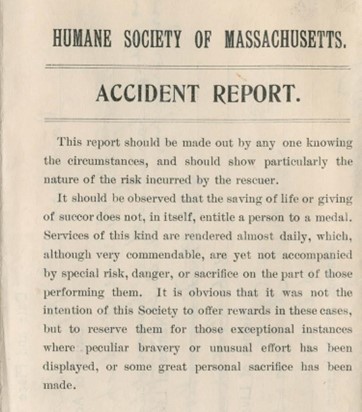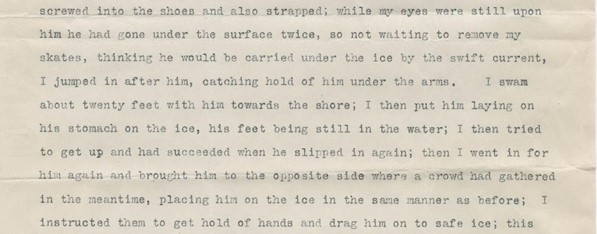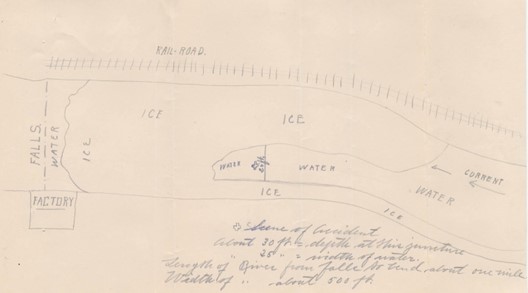By Jacob Savory, Processing Assistant
Predating the animal welfare organization of a similar title, the Humane Society of the Commonwealth of Massachusetts was established in 1786 to rescue shipwreck survivors and ships in distress. The Humane Society existed functionally as a precursor to the United States Coast Guard for the shores of Massachusetts and would even reward individuals unaffiliated with the organization who saved others from shipwrecks. As the Humane Society moved through time, it would expand its efforts from lifesaving seashore tasks to financially supporting mental health care facilities and maternity care facilities. Eventually, its recognition of good deeds would transform into rewarding individuals for heroic personal rescues.
These heroic personal rescues take the form of saving individuals from house fires, drownings, and a number of other scenarios, and those rewarded by the Humane Society would often receive medals and sometimes even financial compensation from the Society. The cover of each accident report, featured below, gives loose criteria, stating that only extraordinary acts of service qualify for recognition by the Humane Society.

One of the first projects assigned to me as a member of the digital production team at the MHS was digitizing Case and Rescue Reports of the Humane Society of Massachusetts records. Spanning 1899 to 1909, the reports most frequently contain a formal accident report, detailed witness testimonies, accompanying newspaper articles, and on rare occasions drawings, pictures, or postcards of the scenario, ship, or location involved.
Case No. 1025 stands out to me among the records, as its file’s contents contain one of those rare instances of an accompanying drawing, this one being written by the rescuer himself.
On 1 January 1909, twenty-one-year-old Boston College student Owen J. McGaffigan and friends were ice skating on the frozen Neponset River near the Mattapan neighborhood of Boston, Mass. In a passing glance, Owen saw the hands of a young boy, Albert F. Donahue, age six, sticking up from the icy river, the boy struggling to stay afloat. Though not knowing the boy, Owen immediately threw off his overcoat and dove into the water to his rescue.

With this struggle, Owen was able to deliver Albert to safety thanks to the crowd ashore. Due to the weight of Owen’s skates, however, Owen found himself in the same dangerous position from which he had just saved Albert. Other young men playing hockey nearby fortunately came to McGaffigan’s rescue, successfully pulling him from the frigid waters.

The drawing Owen submitted to the Humane Society clearly depicts the scene, the depth of the waters, the movement of the current, and the danger of the situation. Though McGaffigan and the boy came out of the situation with their lives, McGaffigan wrote to the Humane Society that he was taken sick from Monday, 4 January until Wednesday, 20 January.
The case file also contains correspondence suggesting the other boys involved in pulling Albert to shore should be recognized and compensated, but ultimately the Humane Society deemed McGaffigan as the primary hero in this scenario, having risked his own life by jumping into the freezing water while wearing heavy skates and getting extremely ill for half a month’s time as a result.
The Case and Rescue Reports of the Humane Society of Massachusetts records are almost entirely digitized and are freely available for online viewing through the collection guide. Due to the nature of these reports, it is extremely important to note the sensitivity of information the records contain – not every rescue produced positive results, and instances of mental health crises, tragic childhood deaths, devastating loss, and detailed descriptions of death permeate this collection.

